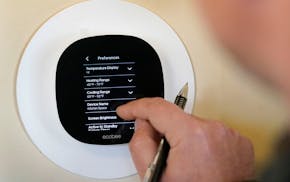The University of Minnesota has filed a lawsuit that alleges patent infringement by a drug company related to the sale of blockbuster medications that can cure patients of hepatitis C.
In a lawsuit filed Monday, the U alleges that California-based Gilead Sciences has infringed, and continues to infringe, on the university's intellectual property rights by selling three medicines that contain the drug sofosbuvir.
The drug is included in the brand-name medications Sovaldi and Harvoni, which health insurers last year called out as exemplifying concerns over the growing cost of specialty pharmaceuticals. The drugs can cure many patients, but were launched with price tags of roughly $1,000 per pill, or nearly $90,000 for a full three-month treatment.
"Gilead has reaped tens of billions of dollars in sales of those drugs, without the University's authorization and without compensating the University," the lawsuit states. "The University invests heavily in the important and groundbreaking work of its professors, and it takes seriously its role in defending their and the University's intellectual property rights."
In a statement, Gilead Sciences said it believes the U's patent is invalid.
"Gilead strongly believes that it has the sole right to commercialize sofosbuvir in the U.S.," the company said. "We believe the University of Minnesota's patent is invalid and is not infringed by the sale of Gilead's medicines for chronic hepatitis C."
In its lawsuit, the U said the drugs are covered by patent rights assigned to the university by Dr. Carston Wagner, an endowed chair in medicinal chemistry at the U's college of pharmacy.
According to the lawsuit, Wagner received in August 2014 the patent in question, which has been assigned to the U.
It is "directed to antiviral compounds and methods for using those compounds to treat viral infections, such as that caused by hepatitis C virus," the lawsuit states.
More than 3 million Americans are thought to suffer from hepatitis C virus infection, the lawsuit states, adding that the disease over time destroys the liver and can lead to fatal complications. According to the lawsuit, the U met in person with the drug company to discuss the patent issue in August 2015.
The university's lawsuit asks the court to enter a judgment that Gilead has directly and indirectly infringed its patent, and seeks "all damages adequate to compensate it for Gilead's infringement, in no event less than a reasonable royalty."
Since 2013, Gilead and rival drug manufacturer Merck have battled in court over patents for hepatitis C medications. In June, Reuters reported that Gilead was freed from paying $200 million in damages for infringing two Merck patents, after a judge found a pattern of misconduct by Merck including lying under oath and other unethical practices.
The U.S. Food and Drug Administration approved Sovaldi for use in December 2013, and approved Harvoni in October 2014. The U's lawsuit also mentions a third Gilead medication for patients with hepatitis C called Epclusa, which the FDA approved for use in June 2016.
The Associated Press reported in June that Epclusa would cost $74,760 for a 12-week course of treatment, or roughly $890 per pill.
Christopher Snowbeck • 612-673-4744
Twitter: @chrissnowbeck
Stock market today: Wall Street opens higher, adding to a hot start for the week
Starbucks takes on the federal labor agency before the US Supreme Court

